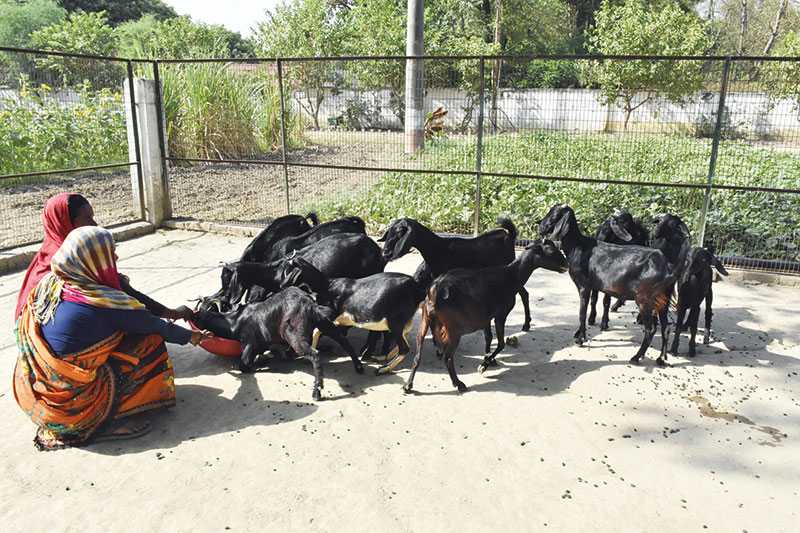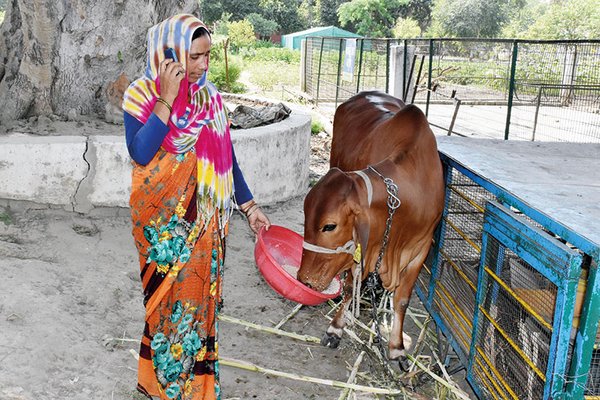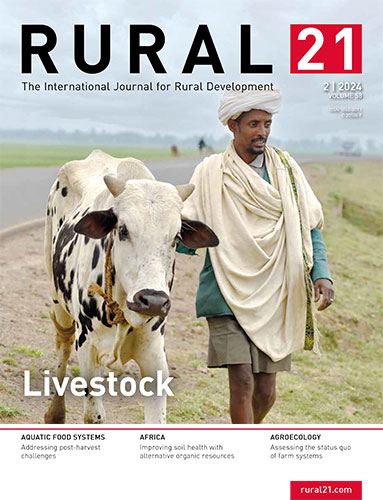 Download this article in magazine layout
Download this article in magazine layout
- Share this article
- Subscribe to our newsletter
Unleashing the potential of women livestock keepers
According to the UN Food and Agriculture Organization (FAO), women comprise about 43 per cent of the agricultural labour force in developing countries where they are engaged in crop production, animal husbandry and food processing. It has been estimated that rural women represent two thirds of low-income livestock keepers world-wide; particularly in the small-scale livestock sector, they are heavily engaged in developing countries. In many regions including India, women are primarily responsible for the daily management of livestock, including feeding, milking, cleaning and healthcare of animals. Their involvement in livestock farming helps alleviate poverty by diversifying income sources and providing a buffer against economic shocks. The additional income generated from livestock farming allows families to invest more in education and healthcare, improving overall well-being.
A whole range of challenges
However, women livestock keepers face a multitude of economic, social and institutional obstacles. They often have less access to essential resources such as land, credit, technology, veterinary services and training compared to men. Also, they frequently have limited decision-making power within households and communities, affecting their ability to influence livestock-related decisions. In many developing countries, cultural and legal barriers prevent women from owning land, which is a significant constraint since land is a crucial asset for livestock farming. Even if a woman owns the land, it is often controlled by her husband or father. Moreover, without land, women lack collateral for loans and access to regular financial services, limiting their ability to expand their livestock operations and potential to enhance productivity. In India, smaller livestock like goats and poultry in backyards are mostly owned by women from weaker sections of the society, but given the opportunity of credit they would expand into other livestock species, including dairy animals like cows and buffaloes. Also, women often face difficulties accessing markets to sell their livestock products, which can be due to lack of transportation, market information, or social restrictions. Agricultural extension services providing training and resources mostly target men, thereby excluding women from critical learning opportunities and hindering their ability to adopt improved practices and technologies. The formal participation of women in agricultural institutions and associations including cooperatives is far lower than that of men, making them “invisible workers”. Moreover, women frequently perform multiple roles, such as household responsibilities and childcare, which can limit the time and energy they can dedicate to livestock farming.
How to improve the situation for women?
Women need literacy (including digital & financial), education and gender awareness to tackle taboos and archaic gender norms hindering their empowerment. Enhancing their access to land, credit, inputs, veterinary and extension services and markets is critical for boosting their productivity and economic contribution. Community-based approaches, such as women’s cooperatives, self-help groups or Farmer Producer Organisations (FPOs) can be effective in providing them with support networks, resources, and collective bargaining power.

In India, smaller livestock like goats in backyards are mostly owned by women from weaker sections of society.
Photos: Mahesh Chander
Digital tools such as mobile apps, SMS messaging and social media can help reach women farmers in remote and rural areas, allowing them to save time and labour, adapt to climate change, participate in decision-making, access extension services and create new entrepreneurship opportunities. Here, initiatives like women-led information networks designed to connect women farmers and agricultural experts can provide women access to information on sustainable agriculture practices, market opportunities and financial management. Similarly, digital agro-innovation hubs focused on promoting the use of digital technologies can offer training and mentorship programmes for women farmers using mobile apps for livestock management to access online marketplaces, digital tools such as weather apps, livestock management software and e-learning resources. Technical information obtained via mobile phones like data on balance feeding, good husbandry practices and animal health and reproductive care translates into higher productivity, reduced veterinary expenses and lower animal mortality. Women, especially those coming from weaker sections of society, may experience difficulties accessing and using these tools, but the extension agents and service providers can assist them. Women are often inclined towards digital tools and are flexible in adapting to change with substantial support but have limited access to smartphones, tablets and the Internet. Their low literacy rate, lack of skills in Information and Communication Technology (ICT), and other factors hinder them in using practically all ICT tools.
Extension and advisory services must have a good number of female staff who can have regular engagement of household members enabling behaviour change and an increased understanding of the significance of women’s participation in livestock activities. This will also encourage household members to be more supportive of women farmers attending training programmes and discussion groups, leading to an increase in women’s participation in such events and activities, and their access to technical and institutional knowledge and markets. Greater participation in personal, household and farm-related activities will result in the economic, social, and psychological empowerment of women farmers, with a long-term positive impact on livestock production.
Government support for women’s empowerment
Microfinance programmes targeting women can help them invest in livestock, improve productivity and enhance their economic status. In India, various state governments have announced schemes to offer women soft loans. For instance, a scheme for providing support to women entrepreneurs was announced on International Women’s Day in 2022 by Haryana State. Under the scheme, women whose family annual income is less than 0.5 million rupees (5,590 euros) are provided access to soft loans of up to 0.3 million rupees by financial institutions. Subsequently, the interest subvention of 7 per cent is also provided for three years through the Haryana Women Development Corporation. The public sector banks in India have schemes to support women self-help groups (WSHGs). The National Bank for Agriculture & Rural Development (NABARD) implements and support the Women SHG scheme announced by the Government of India in backward and Left Wing extremism-affected districts through NGOs, which play a key role in promotion and credit linkage of WSHGs with banks.
A Gender Budget Cell has been set up in the Government of India’s Department of Animal Husbandry & Dairying (DAHD). This cell is mandated to shape the DAHD’s policies and programmes in a way that could tackle gender imbalances, promote gender equality and development of women. The DAHD advises states and implementing agencies to utilise 30 per cent of allocated funds towards women under the schemes it funds. Also, one of the goals of the Indian National Livestock Policy (NLP) of 2013 happens to be women’s empowerment.
Fostering cooperative power and entrepreneurship
India’s National Dairy Development Board (NDDB) promotes women dairy cooperatives. Under the National Dairy Plan Phase 1 (2012–2019), participation of women in the dairy sector was formalised, with Milk Unions being encouraged to organise all-women dairy cooperatives. Various initiatives like appointment of Lady Extension Officers (LEOs) and the establishment of more than 4,000 all-women cooperative societies during the project period put a strong focus on women’s involvement in the dairy sector. The NDDB also encouraged and trained women producer members from across the country, which has enhanced the awareness level of women milk producers and helped them become active contributors in the entire dairy business ecosystem. As the nodal agency to utilise the services of women members of SHGs/ Training and Capacity Building of Human Resources, the NDDB has so far trained 61 Multi-Purpose Artificial Insemination Technicians as livestock resource persons and primary service providers through a new accredited model, ‘A-HELP’ (Accredited Agent for Health and Extension of Livestock Production). The NDDB also initiated the Women’s Dairy Cooperative Leadership Programme (WDCLP) to strengthen cooperative movement by significantly increasing the participation of women as active members and as leaders in governance of cooperative societies, unions and federations. The Board provided assistance to dairy cooperatives in organising women clubs, women literacy programmes, thrift and credit groups, training programmes, also on District Cooperative Societies (DCS) activities, and exposure visits, as well as training programmes in member responsibilities and rights, and Management Committee Members’ duties and tasks. The Leadership Programme helped raise women’s awareness about their rights and responsibilities as cooperative members and encouraged their involvement in social and economic activities. The NDDB continues to organise seminars, conferences and training programmes to assist women in developing leadership qualities and augment their participation and overall representation in the cooperative system of dairying.
All Women Dairy Cooperative Societies could to some extent overcome the problem of women’s limited leadership opportunities and participation in decision-making. The success of women in dairying needs to be replicated in other livestock species like goats, pigs and poultry, e.g. by organising women into self-help groups, women-producer organisations and cooperatives, thus improving their contribution in policy-making processes as well as their bargaining power and access to inputs and markets. One good example is the National Smallholder Poultry Development Trust (NSPDT), facilitated by the NGO Pradan, which enables poor women in rural India to start and run successful poultry enterprises. Similarly, The Goat Trust as one of the largest organisations working in promoting goat-based livelihoods and establishing highly specialised goat-based value chains, has empowered a significant number of women through goat husbandry. The Swablambi Mahila Bakari Palak Farmer Producer Company (FPO), promoted by The Goat Trust in Barabanki district of Uttar Pradesh, is truly a women-led FPO for goat rearing since all its members, including the Board of Directors, are women. This FPO has set an excellent example for the other women-led goat-based FPOs to follow.
The Pashu Sakhi scheme has become very popular in India, particularly in small-scale goat production by women, being implemented by several NGOs and government departments to create awareness and capacity building of the community on livestock-based livelihoods activities and facilitates aggregation and marketing of the livestock products. A Pashu Sakhi (Woman animal friend or Woman livestock counselor/paravet) is a Community Animal Care Service Provider (CASP) that enables last-mile coverage in rural areas where clinical services for livestock are not available on time or expensive to afford for rural poor. Pashu Sakhis also support the members of the producer groups in animal rearing and management towards empowerment of women. They are trained through structured training programmes by the livestock experts and act as medium of interface between the Animal Husbandry & Veterinary Department and rural poor by linking the households to the nearest veterinary aid centre at the time of need.
The NGO Aga Khan Rural Support Programme (AKRSP-India) has organised women into Goat Rearing Groups (GRGs) to create a platform for extension of best practices and collective action, and has so far reached more than 55,000 goat rearing households. It has also created a cadre of women extension workers to provide preventive health services for goats. The services include deworming, vaccinations and knowledge extension. Pashu Sakhis charge for their services from the goat rearers to ensure the viability of their services. So far, over 1,200 village level paravets have been trained under this programme. Members of women self-help groups in Madhya Pradesh promoted by the Programme have also taken up poultry as an income-generating activity for women, making an impact by improving existing backyard poultry and promoting commercial poultry as a micro-enterprise among tribal households.
When a woman…
- ventures out of home and talks to an extension agent regarding livestock development schemes, credit opportunities
- calls a veterinarian to seek advice on her livestock’s health issues over a phone
- calls livestock traders to negotiate purchase or sale of livestock
- joins a self-help group to raise livestock and buy livestock inputs collectively
- gets engaged in processing and marketing of livestock products individually or collectively
…it’s empowerment.
Summing up
Implementing gender-sensitive agricultural policies and programmes that recognise and support women’s roles in agriculture is essential for maximising their economic impact. Rural women need focused training initiatives to cultivate an entrepreneurial mindset among them, inspiring them to come forward, join hands to develop business plans and identify the necessary resources. Initially, some, if not all of them, may switch from subsistence to commercial scale establishing individual or collective enterprises in due course, given their access to all the required resources to set up their enterprise. Over time, such initiatives will create a critical trained mass of women diversifying their income streams, generating an additional or alternative source of income for their families. It is likely that additional income would be invested by women for improving their food consumption patterns and dietary choices, leading to a positive impact on food and nutrition security.
Overall, while women in the small-scale livestock sector in developing countries face significant challenges, their contributions are vital for sustainable agricultural development and food security. Efforts to support and empower these women can lead to broader socio-economic benefits and more resilient agricultural systems. Addressing the challenges they face through targeted interventions and supportive policies can significantly enhance their impact on both household and community levels. Several NGOs, international organisations and governments are implementing programmes aimed at empowering women in the livestock sector by improving their access to resources, training and markets. Some countries are making policy changes to support women’s participation in agriculture, such as land reforms and gender-sensitive agricultural policies. Livestock keeping and production can make a significant contribution to SDG 5 in achieving gender equality and empowering women. But to enable women to meaningfully operate in, and benefit from, the livestock sector, policies and programmes should work to remove all obstacles and constraints.
Mahesh Chander has over 30 years of experience as an Agricultural Extension Scientist at the Indian Council of Agricultural Research, working at the Indian Veterinary Research Institute. His responsibilities include teaching, research, training and field extension services for livestock development. He is currently doing collaborative work with the International Rice Research Institute under the CGIAR Gender Equality Initiative (HER+) on Climate-smart Gender-responsive Livestock-based Socio-Technical Innovation Bundling for Women’s Resilience and Empowerment in India.
Contact: mchanderivri@gmail.com




